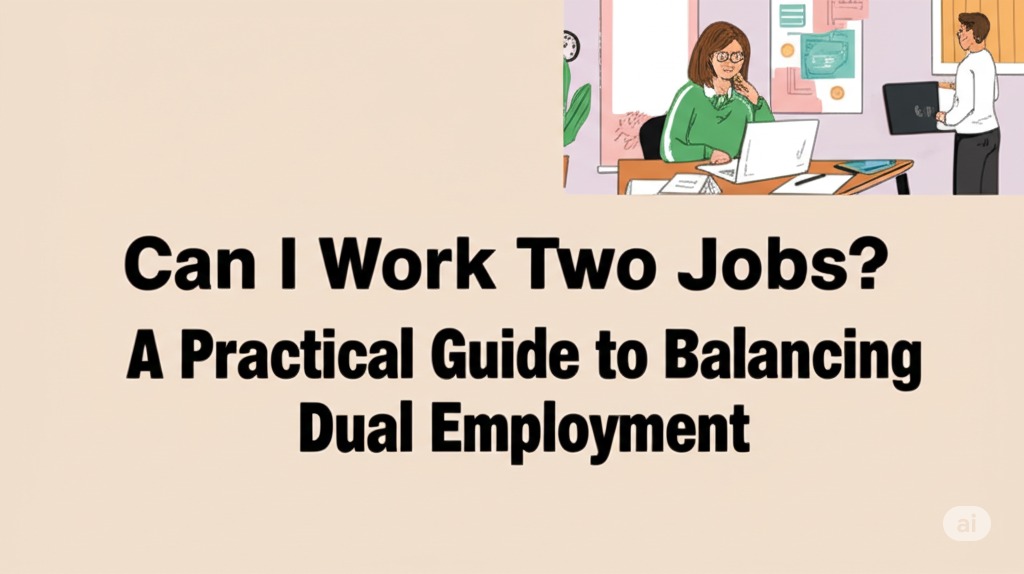
In today’s fast-paced economy, the idea of working two jobs is becoming increasingly common. Whether you’re looking to pay off debt, save for a big goal, or simply increase your income, holding down two jobs can seem like a smart financial move. But is it actually feasible—or even legal? And what should you consider before diving in?
In this article, we’ll break down everything you need to know about working two jobs, including the benefits, challenges, legal considerations, and tips for maintaining a healthy work-life balance.
Is It Legal to Work Two Jobs?
Yes, but with a few exceptions
In most cases, working two jobs is entirely legal—as long as both employers are aware of your employment status (if necessary) and you’re not violating any contracts. However, some exceptions apply:
- Non-compete clauses: Some contracts restrict employees from working with competitors.
- Conflict of interest: If your second job creates a conflict with your primary employer, it could become an issue.
- Industry regulations: Certain sectors, like finance or government, may have stricter guidelines.
✅ Pro Tip: Always review your current employment contract and consult HR if you’re unsure.
Why Do People Work Two Jobs?
People take on second jobs for a variety of reasons, such as:
- Supplementing income to manage living expenses or pay down debt
- Saving for future goals like a house, education, or travel
- Exploring a passion or testing a new career path
- Building skills or gaining experience in a different industry
Whatever your motivation, make sure it’s clear so you can stay focused and avoid burnout.
The Pros and Cons of Working Two Jobs
Benefits
- Increased income: More work hours mean more money.
- Diversified experience: Gain skills in different roles or industries.
- Networking opportunities: Meet new people and expand your professional network.
- Career exploration: Try out new fields without quitting your day job.
Drawbacks
- Time constraints: Balancing two jobs leaves little free time.
- Risk of burnout: Fatigue and stress are common with long hours.
- Tax complications: More income can push you into a higher tax bracket.
- Scheduling conflicts: Coordinating hours between jobs can be tricky.
How to Balance Two Jobs Successfully
1. Time Management Is Key
Use tools like Google Calendar, Trello, or time-tracking apps to stay organized. Plan your week in advance and block off time for rest and personal activities.
2. Communicate With Both Employers
Let your employers know your availability. Honest communication helps avoid misunderstandings and builds trust.
3. Know Your Limits
Listen to your body and mind. If you’re consistently exhausted, it may be time to reassess.
4. Prioritize Self-Care
Don’t neglect sleep, nutrition, or exercise. Your health is your greatest asset.
What to Look for in a Second Job
When choosing a second job, consider the following:
- Flexible hours: Part-time or freelance roles that fit your primary job schedule
- Remote opportunities: Reduce commute time and gain more flexibility
- Low-stress environments: Avoid roles that demand high emotional or physical energy
- Aligned interests: Choose something you enjoy or want to explore further
Do You Need to Tell Your Employer?
In many cases, you’re not legally obligated to tell your employer, unless:
- Your contract explicitly states you must
- Your second job creates a conflict of interest
- You’re working in a regulated industry with reporting requirements
Transparency is often the best policy, especially if there’s potential for overlap.
Financial and Tax Implications
More Income = More Taxes
Earning from multiple sources can bump you into a higher tax bracket. You might also:
- Owe more during tax season
- Need to adjust your W-4 withholding
- Consider quarterly estimated tax payments if freelancing
Keep Detailed Records
Track all income and expenses related to your jobs. This makes tax filing easier and helps you stay on top of your finances.
Is Working Two Jobs Right for You?
Ask yourself:
- Do I have enough energy and time to commit to two roles?
- Will this affect my health, relationships, or performance?
- Is the financial gain worth the trade-offs?
It’s important to weigh the personal and professional costs before committing.
Final Thoughts: Should You Take the Leap?
Working two jobs can be rewarding, but it’s not for everyone. If you’re motivated, organized, and mindful of your limits, it can be a smart way to boost income and build skills. Just be sure to keep legal, personal, and financial considerations in mind.

Andre Cuevas provides career insights, job search strategies, and professional advice to help individuals navigate the job market and achieve their career goals.





